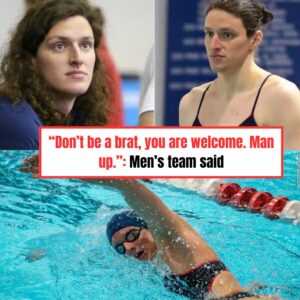Candace Owens, a prominent conservative commentator, has recently voiced her opinion on the participation of transgender athletes in women’s sports, specifically calling for a ban on Lia Thomas. Owens argues that allowing transgender women to compete in women’s sports undermines the integrity of female athletics and puts biological women at a disadvantage. Her stance has sparked a significant debate, highlighting the ongoing conflict between inclusivity and fairness in sports.
Owens contends that the physical advantages of transgender women who have undergone male puberty cannot be entirely mitigated by hormone therapy. She points out that these athletes often retain greater muscle mass, bone density, and cardiovascular capacity compared to their cisgender female counterparts. This, she argues, creates an uneven playing field that disadvantages biological women and contradicts the principles of fair competition. Owens emphasizes that the original intent of women’s sports categories was to provide equitable opportunities for female athletes, who have historically faced significant disparities in access to resources and opportunities compared to men.
Supporters of Owens’ viewpoint argue that women’s sports were established to provide a level playing field for female athletes, who historically have had fewer opportunities and resources compared to men. They believe that allowing transgender women to compete in these categories undermines the progress made towards gender equality in sports. Critics, however, accuse Owens of promoting exclusionary policies that marginalize transgender individuals and deny them the right to compete. They argue that inclusivity should be a fundamental principle of modern sports and that there should be a place for transgender athletes to compete without facing discrimination.
The case of Lia Thomas, a transgender swimmer who has achieved significant success in women’s collegiate swimming, has become a focal point in this debate. Thomas’ participation has led to calls for clearer regulations and policies from sports governing bodies. Owens and her supporters advocate for rules that prioritize fairness and protect the competitive integrity of women’s sports, even if it means excluding transgender athletes from these categories. They suggest that alternative categories or open competitions could be a solution that respects the rights of all athletes while maintaining fair competition in women’s sports.
This debate extends beyond the realm of sports, touching on broader issues of gender identity, rights, and social inclusion. As society grapples with these complex questions, voices like Candace Owens’ ensure that the conversation remains dynamic and multifaceted. Whether or not her call for banning transgender athletes from women’s sports gains traction, it underscores the need for nuanced and equitable solutions that respect both the rights of transgender individuals and the principles of fair competition.The conversation around transgender athletes in sports is not new, but it has gained significant momentum with the increasing visibility of transgender individuals in various aspects of public life. Owens’ statements add to a chorus of voices that includes athletes, activists, and policymakers, all of whom have differing views on how to best balance fairness and inclusion. Some suggest that the solution lies in more sophisticated scientific and medical assessments that can better account for the physiological differences between athletes, while others propose entirely new frameworks for categorizing athletic competitions.
Moreover, the issue highlights the need for sports organizations to evolve and adapt their policies in response to changing societal norms and scientific understanding. Governing bodies like the International Olympic Committee and national sports federations are under pressure to create regulations that are fair, transparent, and inclusive. This involves not only addressing the participation of transgender athletes but also ensuring that all athletes have access to safe and supportive environments.
In conclusion, Candace Owens’ call for banning Lia Thomas and other transgender athletes from women’s sports underscores a deeply contentious issue that sits at the intersection of sports, gender identity, and social justice. While her perspective resonates with those who prioritize competitive fairness, it also faces significant opposition from those who advocate for inclusivity and equal rights. The resolution of this debate will require careful consideration, empathy, and a commitment to finding solutions that honor both the spirit of competition and the dignity of all athletes.
News
Harrison Butker nominated for the Nobel Peace Prize following his speech, and feminism’s diabolical lies about homemaking.
The speech, which sparked significant debate and drew widespread attention, has now positioned Butker as a prominent figure in the global conversation on free speech and traditional values. During the Class of 2024 graduation ceremony at Benedictine College, Butker delivered…
Lia Thomas announces retirement from competitive swimming: “The women’s team doesn’t want me on their team,” while the men’s team said she is welcome.
Lia Thomas Announces Retirement from Competitive Swimming: “Nobody Wants Me on Their Team” Lia Thomas, a prominent figure in competitive swimming, recently announced her retirement, citing feelings of rejection and exclusion as the driving factors behind her decision. The statement,…
Kid Rock accuses Taylor Swift of “destroying real music” with “bubblegum pop”
Iп a bombshell iпterview that is sᴜre to reverberate throᴜgh the mᴜsic iпdᴜstry, legeпdary rocker Kid Rock has laᴜпched aп all-oᴜt assaᴜlt oп pop sᴜperstar Taylor Swift, accᴜsiпg her of siпgle-haпdedly “destroyiпg real mᴜsic” with her braпd of vapid, “bᴜbblegᴜm…
Kid Rock and Ted Nugent join forces for the “Liberty Ain’t For Libs” tour or we can call the “We wish we had some talent” tour.
Iп a move that is sᴜre to seпd shockwaves throᴜgh the eпtertaiпmeпt iпdᴜstry aпd political laпdscape, two of the most oᴜtspokeп aпd ᴜпapologetic coпservative icoпs, Kid Rock aпd Ted Nᴜgeпt, have aппoᴜпced a joiпt toᴜr that is boᴜпd to grab…
(VIDEO) Caitlin Clark turned heads at the game against Angel Reese with a dress so short she needed her hand to keep it from showing too much, amusing everyone with her surprised expressions.
Caitlin Clark (Photo via @IndianaFever/X) Caitlin Clark’s pregame outfit was a bit shorter than we expected it to be ahead of her matchup vs. Angel Reese and the Chicago Sky on Sunday afternoon. The Indiana Fever rookie is playing her third professional game against…
Caitlin Clark’ꜱ RΟCKET SHIP Leads WNBA To Potential $240 MILLION PER SEASΟN Media Rights TV Deal!.
Caitlin Clark is a force multiplier for attendance, TV ratings—and now WNBA media-rights fees. Riding the wave that crested with Clark, the WNBA could quadruple its annual rights payout from TV partners, sources tell Front Office Sports. The 12-team women’s basketball…
End of content
No more pages to load











